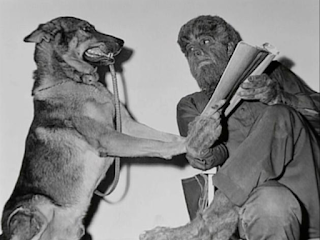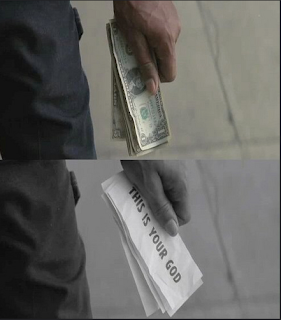As I have said elsewhere, I consider the theory of capitalism put forward in Capitalism and Schizophrenia (especially Anti-Oedipus) to be a response of sorts to the definition of capital as ceaseless modernization that Marx places at the center of The Communist Manifesto.
Sunday, July 21, 2019
Wednesday, July 03, 2019
Interpellated Strategically: on Jean-Jacques Lecercle's De l'interpellation and Isabelle Garo's Communisme et Stratégie
The concept of Interpellation is perhaps one of the few concepts of Althusser's to make it outside the orbit of his circle to become a general theoretical concept. It remember one year in which it seemed everywhere, showing up in books by Judith Butler and Donna Haraway. This has very uneven effects, people who are more thoroughly engaged with Althusser will point out that concept comes from a fragmentary essay, identified as "Notes towards an investigation"itself part of a draft manuscript. Its best insights are derived from either Spinoza or Lacan (depending on who you ask).
Wednesday, June 19, 2019
Doppelgängerland: The New Monster is Us
Monster come in cycles. Werewolves wax and wane in and out of cultural visibility, and even vampires disappear and return. There might even be an end to zombie movies someday. Perhaps the current period will be known as the year of the doppelgänger. I am referring not only to Jordan Peele's brilliant Us, but also the return of the mirror universe in Star Trek: Discovery and Counterpart on Starz. If one wanted to add a literary reference one could include Ted Chiang's story "Anxiety is the Dizziness of Freedom." (I know that there might be more stories and novels, I just reading Exhalation now and cannot resist plugging it).
Thursday, June 13, 2019
Unwritten: On Richard Seymour's The Twittering Machine
Academia functions by specialization. We are all divided into our respective fields, philosophy, sociology, economics, political science, etc., and then once more into the subfields, methodologies, etc. Keeping on top of the relevant material keeps us in our little cells. Publish or perish to the extent that it still remains the law of the land has as its corollary survive by specialization. Academics are like exotic tropical fauna that survive only within a particular niche.
Thursday, May 16, 2019
Breaking the Curse: On Three Recent Attempts to Theorize Neoliberalism
Moose and Lon Chaney Jr. on the set of The Wolfman
I could justify this by the way I have written about werewolves and capital, but the truth is that I just like it
To begin with something of a dialectic. The strength of neoliberalism as a concept is how expansive it is; it offers not just an account of capitalism, of economic relations, but culture, politics, and even subjectivity. The weakness of neoliberalism as a concept is how expansive it is, making it possible to call everything and anything from Uber to yoga neoliberal. It proposes a night when all cows are black, or, more to the point, when all cows are entrepreneurs of their direct farm to market line of organic milk products, as competition and entrepreneurial relations are everywhere. However, to borrow a line from Marx, this excess and limitation does not go from text books into reality, but from reality to textbooks. The instability and expansiveness of the concept might just have something to do the reality of the thing.
Sunday, April 28, 2019
Memories of a Ratman: Becoming Animal in Film, Literature, and Philosophy
Film has a strange status in Deleuze and Guattari's Capitalism and Schizophrenia. There is nothing like a theory of film in the two volumes; as much as the politics and economics of representation through regimes of signs, synthesis of recording, and assemblages of expression are theorized film is barely mentioned. The two volumes have more to say about television as medium than cinema, which will of course later be part of a two volume study by Deleuze. This is not to say that it is entirely absent, and when film does appear it is not as specific medium to be considered on its own but as an illustration of concepts and problems. Which is not to say that film is marginal these illustrations engage the central conceptual problems in each book. In Anti-Oedipus Nicholas Ray's Bigger than Life illustrates the socio-historical nature of desire beyond family confines, and in A Thousand Plateaus the film Willard illustrates the concept of becoming animal.
Monday, April 15, 2019
Becoming Spider-Man: Deleuze and the Superhero Film
In the end of Cinema, Volume One: The Movement Image writes the following about the demise of the movement image:
Certainly people continue to make [movement image] films: the greatest commercial successes always take that route, but the soul of cinema no longer does. The soul of the cinema demands increasing thought even if thought begins by undoing the systems of actions, perceptions, and affections on which the cinema had fed up to that point. We hardly believe any longer that a global situation can give rise to an action which is capable of modifying it—no more than we believe that an action can force a situation to disclose itself, even partially.
It seems to me that Deleuze's picture of the movement image lingering on might be one way to make sense of the superhero film.
Saturday, March 23, 2019
You Will Not Replace Us: On Jordan Peele's Latest
Us is a strange title for a horror film. "Them" and "It" are often the go to pronouns for horror, suggesting otherness and the unknown. In contrast to this "us" is often seen as the familiar, that which is generally threatened by some unknown "it" or "them." "Us" suggests unity not division, familiarity rather than fear, and would in general seem a more fitting title for a sappy romance than a horror movie. That Jordan Peele uses this title for his film suggests how uncanny it is, and how much the divisions between us and them are going to come under scrutiny. Jordan Peele's first film, Get Out hinged on the terror of the realization that one could be betrayed by one's most intimate relationships. While Us works with very different subtexts and cultural anxieties it takes that basic uncanny sense of the foreignness and hostility of what is most familiar to new and more twisted levels.
Saturday, March 16, 2019
The Devil is in the Details: Twilight Zone's Demonology of Capital
It is impossible to overstate how much a fan I was of The Twilight Zone. I watched every episode of the old show, it was the reason that I had a small black and white TV in my bedroom growing up; subscribed to the magazine, a magazine which covered science fiction and published original short stories; and watched the movie and reboot.
Monday, March 04, 2019
Boiling Frogbooks: Education's Past and Future
Portrait of the author as a Hampshire Student
I graduated from Hampshire College. Not only that, but I credit Hampshire for much of my early education. It is for this reason that I have followed the news about its current troubles very closely. Hampshire's troubles, and the possibility that the college could close, feel not just like the future being cancelled but the present as well. It is like watching one's very own condition of possibility disappear. I felt the same way about the elimination of the Philosophy, Interpretation, and Culture program at Binghamton University. It is like that scene in Looper where the character in the future is literally dissected by the past.
Sunday, February 03, 2019
Class Monsters, Or Monsters of Class: Simone Weil's Contribution to a Bestiary of the Present
Simone Weil's "Sketch of Contemporary Social Life" is a text that seems oddly prescient at every turn, making Weil appear to be a seer as much as the saint she is often made out to be. There are references to what later generations would call "the culture industry," "financialization," and even the theories of the imaginary that dominant contemporary politics.
Sunday, January 27, 2019
Working Alone in America: On Lodge 49
The rise of "prestige television" could also be told as a story of the decline of the American dream. From Tony Soprano's nagging suspicion that "The best is over" to Frank Sobotka's assertion on The Wire that "We used to make shit in this country, build shit. Now we just put our hand in the next guy's pocket," so called prestige TV has been as much about the growing awareness of industrial decline as it has been sustained by complex narratives and characterization. Like a kind of Borgesian fable, American television has improved as the thing that it was about, daily life of the middle class, has unraveled. When nuclear families do appear they are just as likely to be fronts for Soviet spies or held together by lies and brutality. No show has taken this decline more literally than Lodge 49. At one point a character even utters the line "post-industrial capitalism."
Thursday, January 03, 2019
Welcome to Bizarro World: Part One
Lately, I have been thinking of Bizarro World. This is odd since I never really read many Superman comics growing up. I was mostly into Marvel comics. What I know of Bizarro world comes mainly from watching cartoons and the general cultural osmosis, despite being an obscure comic book character Bizarro even made it onto Seinfeld. What has provoked me into thinking about it is not the cultural history of the term, but its contemporary relevance. We seem to be living in an inverted world of sorts: capitalists call themselves workers, white supremacists claim to be an oppressed minority, and so on. Everything seems upside down and backwards.
Tuesday, December 18, 2018
It's Competition All the Way Down: On the Spontaneous Anthropology of Contemporary Capitalism
As much as people love to cite that ubiquitous remark by Fredric Jameson about the end of the world and the end of capitalism. You know the one. There is another, less discussed line, that covers the same terrain of ideological struggle and the limits of the imagination that I prefer. It is, “The market is in human nature’ is the proposition that cannot be allowed to stand unchallenged; in my opinion, it is the most crucial terrain of ideological struggle in our time.”
Monday, December 03, 2018
Lensgrinding: Spinoza on Work
With all of the attention on Spinoza by Marxists is is surprising how little is written about Spinoza and work. Spinoza has provided theories of ideology, of alienation, and even of the relation between forces and relations of production, it is surprising that few have remarked on what Spinoza actually says about labor or work. This is perhaps due to the fact that it would appear that there is little there, Spinoza's interests were elsewhere. There are only a few references to work in Spinoza, but I would argue that they are significant.
Monday, November 26, 2018
Transvaluation of Values: On Lordon's La Condition Anarchique
A glimpse of the cover, title, and timing of Lordon's latest book, La Condition Anarchique might lead one to suspect that the anarchic condition it refers to has something to do with financial crises. Which goes to reaffirm what they say about books and covers. The anarchic condition that Lordon is writing about not only has nothing to do with anarchism, nor with some kind of chaos, but with the very existence of values and norms.
Monday, November 05, 2018
We Once Were Ungovernable: On Chamayou's La Société Ingouvernable
Perhaps the best way to make sense of the present order is to consider first the disorder, the contestation of the old order. This could be considered the autonomist hypothesis applied to politics, and it is the underlying method of Grégoire Chamayou’s La société ingouvernable: Une généalogie du libéralisme autoritaire.
Wednesday, October 31, 2018
Year of the Wolf, Part Two : On The Howling
Years ago I wrote what I jokingly consider my contribution to "Wolfen Studies."The other contributions to the field being Evan Calder Williams Combined and Uneven Apocalypse and Alberto Toscano and Jeff Kinkle's Cartographies of the Absolute. In the comments to that post it was pointed out to me that Wolfen was one of three werewolf movies to be released in 1981; the other two films were The Howling and An American Werewolf in London. I initially thought of writing a post on all three, but dropped the idea. Now, years later, I returned to the notion. This October I have been watching a lot of old horror favorites from Hammer films to some classics from the eighties. I decided to rewatch The Howling.
Thursday, October 25, 2018
Halo's Return: Two Versions of the Religion of Capital
Image from They Live
Sometimes students ask me if I think that Marx was wrong about anything. Marxists are supposedly not known for independent thought. I always have a quick and easy answer, the point of reference is not something deep in Volume Three, but in one of the most well known and most cited passages of all. I am referring to the following passage from The Communist Manifesto.
Sunday, October 07, 2018
The Myth of the Paid Protester
This is probably the worst way to begin a blog post, but I can't shake the figure of the paid protester. I am less interested in the rights fascination with George Soros (something that others could analyze better) than I am with the particular mythology of the paid protester. Although, I will say this about the former, the specter of a billionaire using his money to influence politics seems strange coming from people who ostensibly have no categorical problem with billionaires using their money to influence politics. I guess it could be understood as part of the spectacular division of capital, just as there are "woke" and "MAGA" brands, there are woke and MAGA billionaires, opposition to the specific actions of one circumvents any discussion of the entire system.
Subscribe to:
Posts (Atom)



















